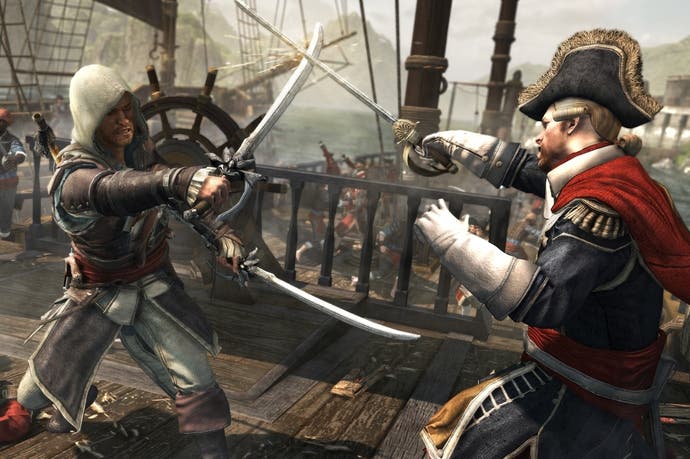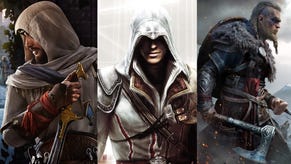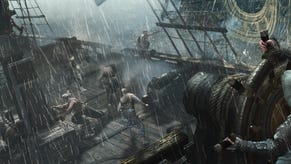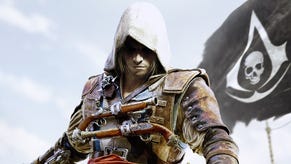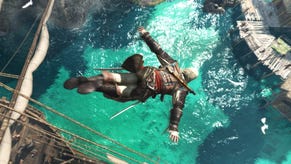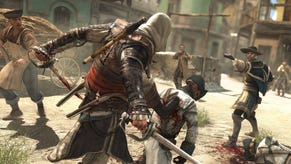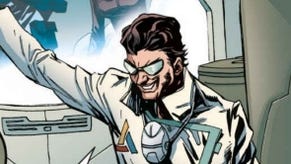Assassin's Creed 4: Black Flag review
Shipshape and Bristol fashion.
If successive Assassin's Creed games have worn you down with the same ageing systems - free-running that seems to snag on every root and spur, simplistic combat built around monotonous counter-attacks and too many missions that only focus on these mechanics, usually after tailing someone while eavesdropping on their conversation - then you should know that these things are still prominent components of Assassin's Creed 4: Black Flag.
You should also know, however, that while they may bog you down occasionally, they are pushed comprehensively into the background by the many other things that you spend your time doing in this open-world sequel - the sixth major instalment in this vast, annualised series of adventures about the age-old war between noble Assassins and dickhead Templars. The result is a surprising breath of fresh sea air.
Set among a vibrant chain of Caribbean islands in the early 18th century, Black Flag tells the story of Edward Kenway, a pirate who plunders his way from shore to shore, evading British and Spanish fleets as he seeks to get rich or die trying. After the ship Edward is crewing picks a fight in a storm and it goes wrong, he starts the game marooned on a beach with a feisty Assassin for company, and ends up stealing his clothes and travelling to Havana to impersonate him and claim his prize.
This inevitably brings him into contact with the Assassins and Templars, and he discovers they are seeking the Observatory, a First Civilisation temple home to the sort of amazing power we've fought over quite a few times already. Rather than join either faction, however, he wants to steal it for himself, imagining how he can sell it for a huge profit and fulfil his dream of returning to England rich and retired. Edward's selfish motives and indifference to the series' duelling causes work in the game's favour, it turns out, giving him possession of a nimble ship that he christens the Jackdaw, and a crew with whom he can sail the ocean pursuing your shared agenda: having fun being a pirate.
There are still large cities in Black Flag similar to those of previous instalments - notably Kingston and Havana, both of which have their own sun-kissed period architecture, local figures and traditional side missions - but whereas the Assassin's Creed 2 trilogy would spend half its time playing tour guide, anxious to show you the Grand Canal or Saint Mark's Basilica, Black Flag breezes over the history of these places, perhaps because it's less iconic. On one level that's a bit sad - I loved all those stories of kids playing Assassin's Creed 2 and then telling their history teachers intimate details of the Borgias where textbooks had failed them - but it makes sense when you get to grips with Black Flag. These are transient locations for you and for Edward, largely good for pushing things forward and making a bit of scratch. The real game is out at sea.
Standing at the helm of the Jackdaw, the whole map is open from the start - although the southern seas are more treacherous than the north - and almost every island, peninsula and slip of land has its own combination of viewpoints to scale, treasure to dig up and secrets to reveal. What's more, the transition from ship to shore is non-existent - you just pull up wherever you like, dive overboard and walk up the nearest beach.
There's a great balance and zip to the way you pinwheel around the game's vast oceans, stripping treasure maps from corpses and sailing to their coordinates, eyeing up schooners and frigates through your spyglass and weighing the value of their cargo against the difficulty of the fight they'll put up, diving to shipwrecks and underwater cave networks, harpooning sharks and whales to fashion new pouches and armour, and just ramming and broadsiding anyone who gets in your way. Where Edward can feel slow on land, the Jackdaw is lithe and responsive, from the simplest act of sailing to the most pitched of sea battles.
There's a lot to do, but it all fits the set-up, making the game feel lean and wiry despite its enormous scope. After the grand sweep of Assassin's Creed 3, a massive adventure whose edges were packed with middling diversions that were crying out for stronger editing, perhaps anything would seem more focused, but Black Flag is a startlingly coherent open-world game by any standard, not just its predecessors'. And while the process of doing and collecting things in an Assassin's Creed game can often feel like completing a jigsaw puzzle rather than writing your story, Black Flag is much better at disguising repetition in interesting ways, too.
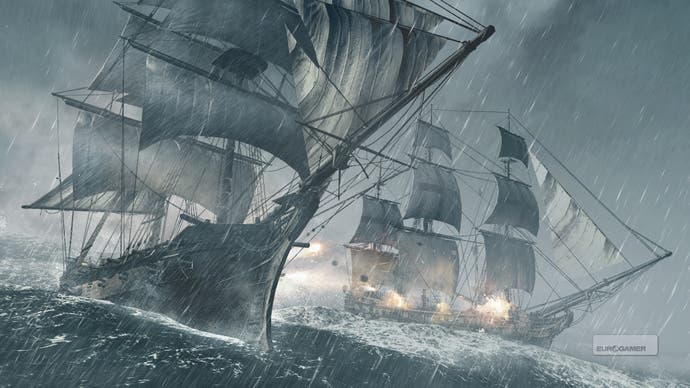
There's a far stronger sense of attainment, for instance, along with the feeling that you're at the mercy of the ocean. You'll ride mountainous waves through stormy seas to take down a galleon that gives you the metal and wood you need to reinforce your hull - upgrading the Jackdaw becomes increasingly important and desirable. You'll seek out Mayan statue puzzles in scattered ruins because they lead you to whatever is behind that door at the base of the pyramid. And you'll pursue all those Templar keys because you want that suit of armour you know is hanging in the mansion on the hill. That might all sound like an obvious way to set things up, but so many open-world games struggle to lace their exploration with a sense of anticipation and serve it to players in a way that makes their labours absorbing. Black Flag doesn't.
The game's success also owes a lot to little touches that give your seafaring adventures depth to suit those broad vistas. Clouds form on the horizon, foretelling wild storms that send you bouncing through rogue waves. Calmer, lolloping seas under the midday sun are shot through with the green and gold of trapped rays. And the way your crew sing sea shanties, irritating at first, becomes an essential part of each trip. I imagine not everyone will want to hear a mournful song as they set sail for a distant location and choose travel speed, where the camera pulls back to a deliberate angle that captures the Jackdaw carving through the waves, resplendent in the West Indian sun as you gently pull left and right on the ship's wheel. But I love those peaceful moments. For everyone else, there's fast-travel.
When story or curiosity sends you ashore, you'll find a game with more self-awareness about the mechanics it's inherited. Mission locations in particular are sympathetic to increasingly crude stealth controls, filled with networks of low bush and scrub that shields you from sight, so that even though you still stroll maddeningly around when all you want to do is drop prone, the odds are often far enough in your favour to keep you out of trouble. Assassin's Creed certainly needs a systemic overhaul, but the fact it hasn't come in time for Black Flag isn't enough to throw this game off-course.
Nor is the series' great love of binding tutorial to story, although it does mean that Edward's adventure takes a while to find its sea legs. As usual, the game needs to find so many excuses to explain how things work that it obscures the storytelling, and during these periods Edward and his pirate friends can seem quite boring. It's hard to keep Edward's promisingly duplicitous introduction in mind, for instance, as the game lines up a tutorial by having him stand in a bar quibbling with Benjamin Hornigold and Edward Teach about the state of local sanitation.
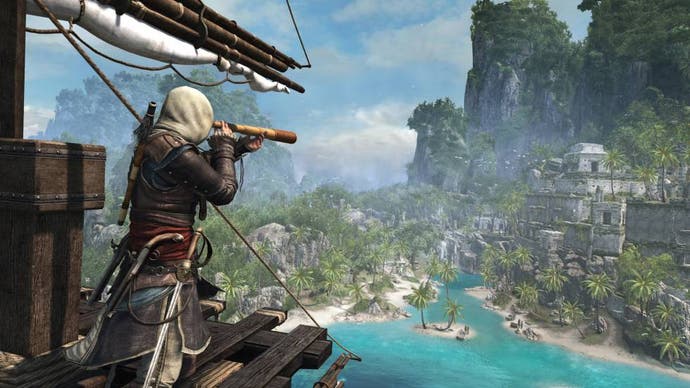
Fortunately, the set-piece missions that these 'tustorials' (have that one for free) build towards are often worth the bother, like the first time you use the diving bell, squirming among jellyfish for sunken chests and then creeping past sharks by hiding in clumps of seaweed, or the time you guide the Jackdaw through narrow freshwater bayous in the dead of night, leaping overboard to dodge crocodiles and snuff out watchtowers before returning to the helm. The game favours stealth far more than its action-orientated predecessor, too, rarely boiling things down to a swordfight when you could climb over the outside of a fort. If things go awry, you can reload a convenient checkpoint rather than cutting your way free.
When the story shakes off its responsibility to play instruction manual, Black Flag really flourishes. After setting up a pirate haven called Nassau, Edward's friendships with the likes of Charles Vane, James Kidd and Blackbeard are tested as everyone pursues their own agenda and allows their collective responsibility to falter. Blackbeard is obsessed with his impending retirement, for instance, distorting himself into a legendary monster who drinks rum spiced with gunpowder, but his fearsome reputation also puts a huge target on his back. Confident actors like Ralph Ineson, who plays Charles Vane, give each character conviction and swagger tempered with uncertainty.
As things fall apart, Edward discovers he can't do it all alone after all, but while Assassin's Creed games sometimes beat their heroes forcefully into the Assassin cause with blunt tools at times like this, Black Flag is patient. Assassin's Creed 3 protagonist Connor Kenway was an Assassin but his father Haytham was a Templar, after all, and even as the infamous pirate Black Bart enters the race for the Observatory and the ties that bind Edward to his descendants become clearer, there is no life-changing pivot, just the gradual accumulation of bumps and knocks that keep pecking away at him. His path rarely seems in doubt, but the outcome is surprisingly smart and grown-up for a series that has often resorted to bewildering science-fiction.
Edward's formative experiences dovetail well with the game itself, too, and I found it interesting how well Black Flag compares to Grand Theft Auto 5 - a game where the gap between the psychopathically hedonistic behaviour of its players and the underlying narrative of the characters widens until it is unbridgeable. Black Flag is almost the opposite, a game where you start off as a self-indulgent mercenary, who is then steadily pursued by a growing sense of unease about his place in the world and lack of humanity. By the end of the game, you have made Edward do many things he regrets in order to do things like upgrade his cannons, unlock a nice steering wheel and build that bar on Inagua, and there is a reckoning.
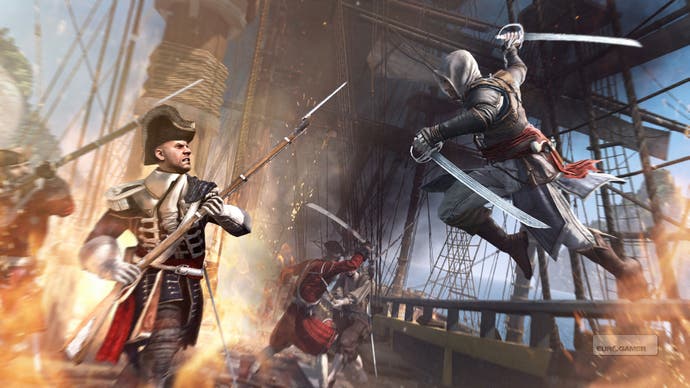
In the wrong hands, this could have been a lame duck year for Assassin's Creed at the end of a console generation: floating around on old mechanics, a game and story caught in limbo. I even felt that a little in places - this is another vast game, after all, taking me around 30 hours to finish the story with a 60% completion rating, so there were naturally a few slumps - and that occasional sense of ennui would usually creep up on me when I spent any time on land, picking my way through familiar surroundings.
But the developers have worked around the series' foibles brilliantly. The obligatory present-day sections of the game are a case in point, showing you behind the Templar curtain and telling a neat short story that ties into Edward's adventures and keeps you sated, even though it doesn't advance the meta-narrative that much. Back in the 1700s, clumsy mechanics are downplayed in favour of the thrill of the open sea, where everything feels fresh and exciting. If I ever felt down while roaming rooftops, I just answered the call of the ocean and everything was right with the world again.
And of course, once the credits have rolled, you can guess where the game leaves you. Out on the deck of the Jackdaw, clear skies and rolling waves as far as the eye can see, a wiser man under your thumbs and a sea of icons left to sail between. Edward doesn't have the impish wit of fan favourite Ezio Auditore, against whom all Assassin's Creed protagonists are destined to be measured, but in the end he felt more rounded to me. The revelation, though, is the treasure of a game he stars in.
As you roam the seas in Assassin's Creed 4 you'll encounter some particularly challenging ships. Our guide contains strategies to help you beat every Legendary ship in the game.
